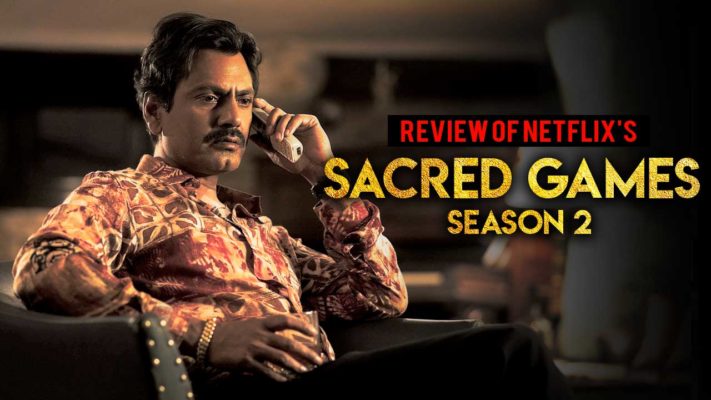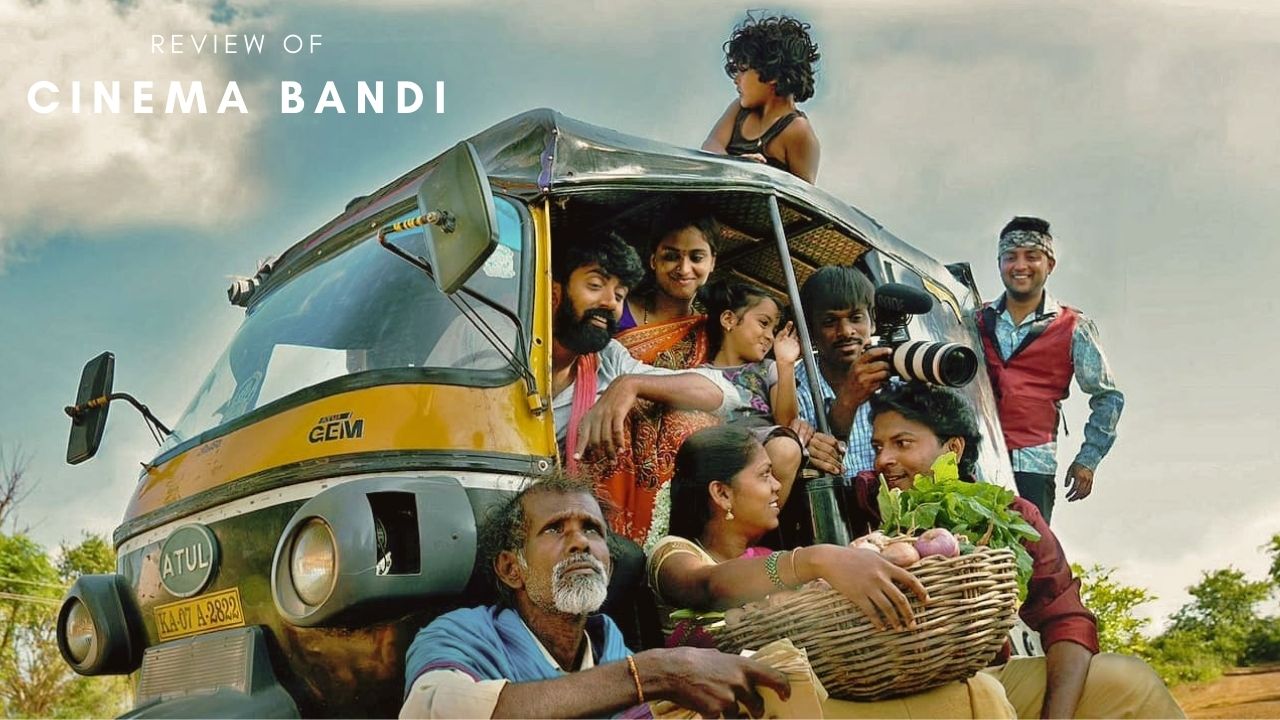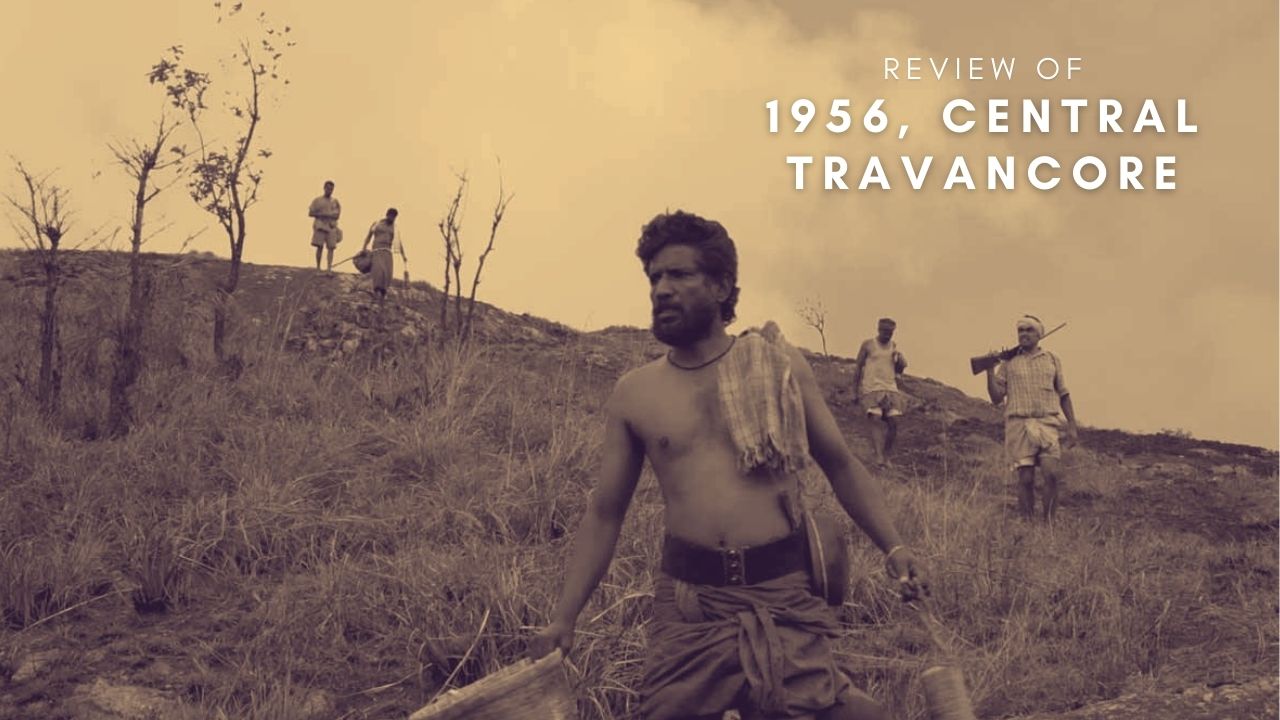
Right After We Left – Sacred Games Grows Bigger
‘Apun Ko Nahi Pata Tha Ki Apun Kahan pe Tha……Apun Ko Buss Gaand Maarna Tha’ says a melancholic Ganesh Gaitonde (a role defined and owned by Nawazuddin Siddique) while he finds himself in the middle of the sea, bound under dock with nothing to eat and nothing to live for. This one line, as if intended by a meta narrative, defines the whole season through its course. From nowhere to everywhere, the saga takes a dramatic arch, often relying on popular character tropes, and world ending philosophies.
Now, This is the premise with which Sacred Games Season 2 starts. In the middle of nowhere, both in the tracks of Ganesh’s past, of redeeming himself, and Sartaj’s present, where a literal ticking bomb situation is driving the city to chaos. A quick recap of the season one is stitched before the season, which serves to remind us that the lives of these two men, Ganesh Gaitonde, a small time thug who within the course of the last season grew to the heights of political power in Mumbai and became a self-proclaimed Gangster God, and Sartaj Singh, a beaten to grind Mumbai Cop, who is grappling with his own issues of loss, department bullying and more, intertwine towards a greater purpose and being.
Now, if you haven’t watched the Season One, then Season Two might be a challenging task to figure out. Season Two never gives you the time to know who these characters are, where they come from and how are they essential within the grand plan of things. The series picks up where it literally left off and hits the ground running, and so any ignorance of its former series serves not to be an excuse here.
The Story Of Two Men – Gaitonde And Sartaj
Ganesh Gaitonde, beaten and severed off of his ties to the gangster life back in Mumbai, finds himself now working undercover in Mombasa, Kenya. He has been recruited by Kusum Devi Yadav, a RAW agent under Indian Embassy in Kenya, played by the ever reliant Amruta Subhash (last seen in Gully Boy). As does Ganesh Gaitonde, over the first couple of episodes, there seems to be a lot more than meets the eye in case of Ms Yadav, who seems to have her own agenda in helping Ganesh Gaitonde to reclaim his stature. Ganesh then sets off on a journey to establish his smuggling business out of the port of Mombasa, slowly forging ties with local businessmen and thugs. However, we learn that his prime focus is on Season One’s Isa, who has now ties with ISI agents across the world. Through his stay at Mombasa, he also gets in touch with Jamila (who first appears to give him a blowjob at the prison at the Season One finale). Jamila (played by Iranian Actress Elnaaz Norouzi) becomes Ganesh’s squeeze, as he flaunts and uses her as per his own whims and wishes, only later to be betrayed by her.
In the meantime, Ganesh is also introduced to his proverbial third father, Guruji (played by Pankaj Tripathi) and the ashram of well-being. Soon, Ganesh finds himself attracted to the teachings of Guruji, as existential philosophies and inner meaning of life, starts becoming apparent to him. Ganesh also starts having a soul connection to JoJo (played by Surveen Chawla) who has a inherent death wish inside of her for a past guilt which keeps haunting her every moment. Years turn to Decade, as Ganesh sets foot in Mumbai almost a decade later only to realize Guruji’s grand plan for a new and better utopia. The rest of Ganesh Gaitonde’s storyline pans out towards his natural conflict and his societal responsibility, and finally arriving at an almost cathartic answer to his morally conflicted questions.
On the other hand, Sartaj Singh, played with restrained anger by Saif Ali Khan, now having to deal with only 12 days to save his city, frantically keeps searching for leads and clues ably supported by Inspector Majid Ali Khan (played by Aamir Bashir) and SPI Markand (played by Samir Kochhar). As the searching for the ticking nuclear bomb, seems futile and all hope is lost, Sartaj Singh meets Batya Abelman (played by Kalki Koechlin) a protégé of Guruji as she starts showing him the path of skewed righteousness. Through his journey, Sartaj Singh finds terrible revelations of his past, which unknowingly but absolutely tie him with the ongoing proceedings. Sartaj is then forced to confront his past, and decide not only just his, but a nation’s future as well. In the course, he finds out more about Ganesh Gaitonde, and in the process unmasks his true nature towards the world around him.
Season One Obsession Becomes Season Two Obligation
While these two tracks of these two singular men, became the central conflicting point in Season One, Season Two derives its strength and often weakness too, in pushing across multiple characters who for the most part, serve as story forwarding devices or just plain stereotypes. Ofcourse, having an expanded view of things and perspectives is always necessary to tell a story such as this at a grand scale it deserves. However, when too many characters, motivations, perspectives are shouldered forcefully upon the central two narratives, it ends up the story as incoherent. Perhaps that is what fails to work with Season Two.
The makers ensure that every character that appears even faintly on screen, is somehow or the other connected to the central characters. That hampers the storytelling in a way that the makers always need to accommodate the leads in places they would not naturally be at or appear in plot points that they don’t necessarily abide by. Due to this, the narrative looks as if it is trying to hard to make logical sense of things. There is no chain reaction or butterfly effect going on, and there is absolutely no absurdity to things, which I think deprives the story of this scale, the sense of grandiose and natural intervention. Although, many might fail to point the apparent mistakes in the plot as explained above, what these forceful inclusions of tracks does, is that it takes you out of the story often. And there in lies its weakness. By the end of the Season Two, you don’t seem cathartic or enriching. You are left to feel that the story has been told, because it was supposed to.
Casting Done Correct Ft Pankaj Tripathi
Having said this, Sacred Games has always been a trendsetter when it comes to its casting choices and I’m happy to say that it never misses the mark in Season Two as well. Much has been said about Nawazuddin Siddique, Radhika Apte, Kubra Sait and Saif Ali Khan in Season One. However, it comes as a surprise to no one, when I say that the biggest strength of Season Two lies with Guruji. Pankaj Tripathi, plays Guruji with such dislocating serenity and meta-sexual apathy that you are convinced that every word uttered by him, is indeed the word of a natural God. Tripathi brings his own slurs and whims to the dialogues, which reminds one of Osho, in his abrupt speech pauses and radical sense of humor. However, if there is one chink in his armor, it has to be his apparent philosophy and elaborate justifications.
For a dimensional being like Guruji, I find it hard to believe that he wears his philosophy on the sleeve, predictable by even the temps at the ashram. You can see his grand plan coming from miles away and then the very pretense of having a Guruji explain it out to the people, seems unnecessary and tacky. His higher plain of understanding is the understanding we were introduced with last year’s Thanos. So perhaps, Guruji is a bit too late in the game. Guruji’s mythos and philosophy is heavily borrowed from Osho, with a handful of Fredrick Nietzsche thrown into the mix.
Although the character is markedly uni-dimensional, Pankaj Tripathi manages to instill seething stoicism in making the role standout for the most part. However, even to his caliber, Tripathi cannot make Guruji an authoritative and charismatic spiritual leader, who has marked his time on Earth, though not for the lack of trying. A tad bit unpredictable, a bit of humor and approach-ability, and perhaps even some shades of pure menace, would’ve worked wonders for the characters, which by the end of it works only for its actor but not for itself.
Kalki Does Her Best To Salvage…
Another character which makes an impression but doesn’t really stay with you is that of Batya Abelman. A faint memory of Maa Anand Sheela at Osho foundation, Batya a conflicted soul becomes the closest associate and an apparent protégé of Guruji. Kalki, usually surgical in her portrayal of conflicted roles, for the most part here sleepwalks through it, neither adding a level of empathy nor deriving a sense of foreboding to the story. An essential bridge between Sartaj and Ganesh, Batya never really brings anything new to the table. Although Kalki at times brings her own projection into playing Batya, with her inherent charm, west European accent and worldly outlook of things, we still get a sense that its not Batya but Kalki playing Batya. There in lies the problem with Batya. She is never quite here and never quite there.
In other new characters, Kusum Devi Yadav portrayed with palpable poignancy by Amruta Subash hits the right beats and manages to make a grand impression whenever she is on screen. She brings the classy ramone style with retro attitude in her portrayal of a secret agent which is refreshing to see. However, her character doesn’t stay for long in the grand scheme of things, and only serves the purpose of being a knot which ties up a couple of strands. International terrorist Shahid Khan played by Ranvir Shorey is passable at best, which is saying a lot for an actor of such caliber and versatility. One wonders if he was cast only to give the indie movie nerds a thing to talk about and add potency to the casting overall.
OverSimplification Of Characters…
The characters like Bunty (Jatin Sarna), Malcolm Mourad (Luke Kenny), DCP Parulkar (Neeraj Kabi), Home Minister Bhipin Bhosle (Girish Kulkarni), Megha Singh (Anupriya Goenka), Trivedi (Chittaranjan Tripathi) and Kanta Bai (Shalini Vatsa) are reduced to one or two scenes, as the story demands less of them. The story ofcourse is almost obsessively focused on Gaitonde and Sartaj, that nothing else really matters. Thus, Sacred Games suffers from over-simplification of characters and over-exaggeration of ideas. Ideas, which seldom work as they are only treated as plot points for its two leads to bathe in, but not something for the viewers to ponder upon and feel elevated about. As far as the fun goes, Season One, I still believe was funnier and edgier than this outing, purely because it placed the characters where they needed to, which is not,well, everywhere.
At the end, Sacred Games the dual seasons, end on an ominous and calculatedly abrupt note, which was a clever way to end it. The experience of Sacred Games, however was complete on the paper, but never really in the spirit. In the tale of two men, one hunting something, and the other haunted by something, a grand story might’ve required a much expansive telling and adaptation. There were still ideas to be explored, characters to be defined, and plot points to be resolved, which one might stand to wonder could have been a possibility in the novel format. However, when it is adapted to screen, with such grand promise, there is an inherent urgency to tie things up as quickly as possible. And that affords lesser and lesser time to stop and ponder on things and their essence. Thus, losing before becoming lost, and winning before knowing what victory means.














